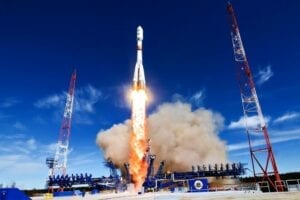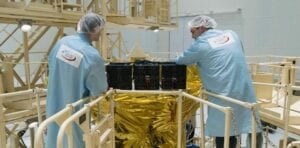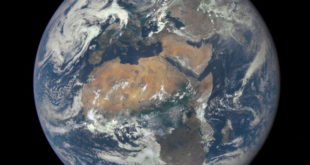by Rania Toukebri

All the eyes have been turned to the launch of the first satellite Challenge One built by the Tunisian private telecommunications company TelNet, blasted off along with 37 other satellites aboard a Russian Soyuz rocket from the Baikonur cosmodrome in Kazakhstan on March 22nd, 2021.
The consequences of this event were not limited to the success of Telnet, but they also allowed Tunisia to change its classification from a consumer to a producer of space products and services. Investors and agencies from all over the world are now more open to collaborate for future missions. Tunisia is also considered the sixth African country to manufacture its own satellite.
On a local level, the launch of a first satellite accelerates the organization of the space sector and the mitigation of future space programs and policies. Several universities started considering small space projects like the National Institute of Applied Science and Technology “INSAT” and National Engineering School of Tunis “ENIT”. Other private companies started studying the participation to space related projects. For the first time, multiple seminars and webinars took place about space, showing that the awareness has been well raised. Students and young professionals started being curious about space and considering a space career. New organizations started their activities. All this dynamism created by a single launch prove that it had provoked a real swap in the national space arena.
Consequently, it is now a crucial time to kick off indigenous initiatives and programs that will focus on local capacities. In traditional cases, the emerging countries that are considered newborn in space would fit better in common projects with either space fairing countries or countries from the same region that share the same goals and have the same challenges and needs. The question to be addressed in these circumstances are; in which region Tunisia can be the most active, which policies and programs are more adapted to the local needs and what benefits it can have from each potential collaboration. Can it be the participation to regional and international space projects, is it through collaboration and common work with the Arab Union by the Arab Satellite and the future plan of an Arab Space Agency or is it by its participation to the African Union Commission work and the future African space strategy. The good point is that the localization of Tunisia makes it more open to collaborations to exchange resources more than any other country in Africa. It is well linked to Europe in the North, Middle East in the East and strategically, far east countries as well as the west countries have established good networks and common projects several years ago.
In order to identify the best option to take, we should make a situational analysis, studying the local, regional and international market, understanding the needs, national priorities and the space technology solutions that will develop the strengths and address the weaknesses. It should also consider Tunisia earth technologies heritage.
Tunisia should have a clear vision and well adapted strategic objectives, in view of the expected outcomes, the macro and micro level Impacts.

If we will kick off any space related strategy, we should first be apprised of the space solutions to the current challenges in order to meet with the society´s challenges. Space technology will allow the citizens to communicate worldwide, it will locate any fixed or moving object anywhere on the surface, it will observe any spot-on earth very accurately. With satellite imagery, maps can be produced in a fraction of the time it would take using laborious ground surveys. The use of synthetic aperture radars or stereoscopic imaging provides topographic maps of the landscape. These solutions will study challenges like desertification, climate change and deforestation. On another level satellite navigation uses satellites as reference points to calculate positions accurate to within few meters. With advanced techniques and augmentations, satellite navigation can make measurements down to millimeter levels. Navigation and positioning receivers have been miniaturized and are becoming economical thus making the technology accessible to everyone. For example, GNSS (Global Navigation Satellite Services) receivers are currently built into cars, boats, planes, construction equipment and even laptops to provide accurate geographic coordinates of these valuable assets. Navigation and positioning is the main element of the international air traffic management system providing worldwide navigation coverage to support all phases of flight. With appropriate augmentation systems, navigation and positioning satellites will enable gate-to-gate navigation and all weather capabilities for suitably equipped aircraft. With more precise navigation tools and accurate landing systems flying do not only become safer, but also more efficient by reducing delays, diversions and cancellation of flights.
Satellite communications is the key technology that could bring developing countries like Tunisia to participate in the build up of the global information infrastructure. Research indicates that wireless systems are the most cost effective way to develop or upgrade telecommunications networks in areas where user density is low. Such wireless systems can be installed 5-10 times faster and at a 50% lower cost than landline networks. The Internet in Tunisia is limited by a low penetration rate when compared to other countries, and overall available bandwidth indicates that Tunisia as well as the African region is way behind the “digital divide”. This is the era of internet of things and things of the internet. Satellite communications can fill the gap and increase broadband access, particularly in land locked countries and rural areas where cable penetration is non-existent. Integrating information and communication technologies “ICT”, into governance processes can greatly enhance the delivery of public services to all citizens. ICT integration will not only improve the performance of governance systems, it will also transform relationships amongst stakeholders, thereby influencing policymaking processes and regulatory frameworks. In the developing world, however, the potential of ICTs for effective governance remains largely unexplored and unexploited. Such services can be delivered through connectivity via satellite links in areas with minimal access to internet. Satellite connectivity involving post offices may be used for access to such services for those who have no access to internet. Technologies for education and training, in particular distant education and multimedia, may be instrumental in meeting the needs of countries that have to train and integrate a large number of workers in widely dispersed and under-equipped areas. This allows for a constant renewal of skills without being limited by Information Technology (IT) infrastructure. The use of VSAT terminals coupled with communication satellites makes education more accessible, especially in rural areas.
The numerous solutions that space technology could bring to earth could raise.
At this level, a situational analysis is necessary, based on SWOT analysis, we can identify the different strength points that Tunisia has. Starting by the existing earth technology that could be used as basis to develop space technical capabilities, the experience that several Tunisians has in the space sector, the young population that could serve for a 100% local space sector, growing partnerships and increasing support from space fairing countries and regional entities that work on the regularization of the space sector, the location and the southern ocean islands, Antarctica and the South Atlantic Magnetic Anomaly that is suitable for space physics studies, the rural communities that are under-populated and whose needs can be supported and provided by space products and services and the growing political willingness to support the space sector after the success of Challenge One Launch and following the new big updates happening in the globe.
The weaknesses are many though, starting by the safety and security concerns, the lack of financial capabilities, lack of data management, poor internet connectivity and limited electrical power limiting the potential improvement of the infrastructure, limited access to space related databases and libraries, the absence of space education in universities, the lack space awareness in stakeholders and investors cercles.
Coming to the opportunities, we are currently in a huge global change that is supporting space platforms and needs further products and services, the attraction of skilled Tunisians aboard that will present a great opportunity for a rich indigenous space experience, the collaboration plan on the allocation and use of frequencies at an African level will provide opportunities for the hosting and operations of key equipment and facilities.
The threats are quite challenging in the current circumstances starting by the political instability and the weak financial base that will detract the attention to the future development of the space sector, the fast technological development will certainly reduce the effectiveness of the space technology in Tunisia, there are already many international contenders for frequencies allocated that could limit the future usage of these resources, the poor space policy and law development, the big issue of the brain drain that could erode the current space related expertise and the reliance on the outside of the country that will cause the infiltration of external interests.
This analysis should allow us to understand the current situation that will consequently address the weaknesses and develop the strengths. The first point to make on that level is concerning raising awareness targeting the decision makers, investors and citizens to build a solid space society and facilitate the creation of projects and programs addressing the social challenges. The educational program remains a basic pillar for the development of this sector, strengthening the existing nodes of space and in-situ capabilities, harmonizing and standardizing the suite of critical facilities and infrastructure, the adoption of appropriate data management and policies promoting data access and sharing the space experience, work on a regulatory environment that will be conductive to the promotion of the Tunisian space sector and organizing the activities, building a big base of human capacity for space related activities, using the strategic location of Tunisia to create links with the countries around for developing the scientific and technological infrastructure, securing broadband capacity that will be needed to operate scientific equipment and infrastructure and to ensure seamless connection that will be needed for data management and sharing.
In a second level, we should respond to the opportunities and manage the threats by using the international partnerships to support the development of space platforms, linking the national needs with the services provided by space technology for the socio-economic growth of the nation, pursuing a main regulatory framework for a long term sustainability of the space sector, building on the existing earth technology heritage that can be used as a tool.
The existing analysis will guide us to a main vision that considers the advantages that Tunisia will take from the space services and products to improve the quality of life of the citizens through local projects and collaborations at the regional and international scale.
We should then address strategic objectives that will focus on 5 main points. The first one is by adopting a good governance for a sustainable and well managed sector, that Tunisia needs as a base. The second one is by coordinating the space sector to maximize the benefits and avoid the duplication of efforts and resources, this includes the centralization of data. The third one is by highlighting the user needs to address effectively Tunisia´s socio economic development. The fourth one is the way the international cooperation will be promoted for mutual benefits. The fifth one is strengthening the existing technology to ensure an optimal access to space technology and developing the national space market.
Based on these objectives, expected outcomes should be considered for the next 20 years, 5 years and 1 year. During the first year, several plans should be formed by the experts and stockholders, research and technology program, human capital plan, strategic partnerships plan and operational development of the space services and products.
During the following 5 years, a full space program shall be established, and the first steps of the plans should be taken. Later, during the next 20 years there should be a good base of human capacity, technological infrastructure and a clear strategy and policy, where several challenges are partly addressed.
We should by now underline the basic challenges and consequently the priorities of the nation that should be urgently addressed. Tunisia, as several African countries has currently major issues related to disaster management, energy shortage, poor communication, climate change that are affecting citizens and business. The decision makers should consider studying the current conditions and providing precise and up to date information for the national development decisions. Considering security, transport and communication infrastructure, human capacity, environmental protection, health, finance, market, governance, tourism development and social welfare.
The optimal implementation of the space strategy should be applied in the 3 main categories: Economic, Political and Social creating stability, security and prosperity and improvement of quality of life. Particularly, space technology should be able to bring solutions to biodiversity, agriculture, ecosystems, water, energy, finance and health.
The process for this implementation is very commonly used. First the mission requirements should be identified from the design to the delivery phase, second the technical tools must be clearly defined, then the space mission operations and the space applications providing the value for the decision stakeholders and the community as a terminal.
At the end, Tunisia needs to work more on the governance and long-term strategies. The heritage of earth technology should be well exploited, and the well-established strategic partnerships shall be reenforced for common benefits in a regional and international scale. As described in this article the common view, goals and challenges with the African countries allows a legitime regional collaboration. But the limited technical development and lack of experience should allow an opening to the space fairing countries that will support the technical development in a shorter period.
However, the necessity of building this sector on local capabilities should be mostly highlighted, it will allow a sustainable development and will endorse the national capacities and decrease the technical and financial dependance to the strategic partners.

Rania Toukebri is a Space Engineer, Top 10 under 30 space experts in Space in Africa and Top 3 Ten Outstanding Young Persons (JCI Tunisia). She is working on spacecraft architecture, participating in several European Space Agency projects for earth observation and space exploration. She is a researcher on quantum technology and data security. She is also Space Strategy Consultant and Space for Women Mentor (UNOOSA project). She is co-founder and CTO of OnaSpace. She is Regional Coordinator for Africa in Space Generation Advisory Council in support of UN for space application and the CEO for Tod´aers to enhance international space research.





